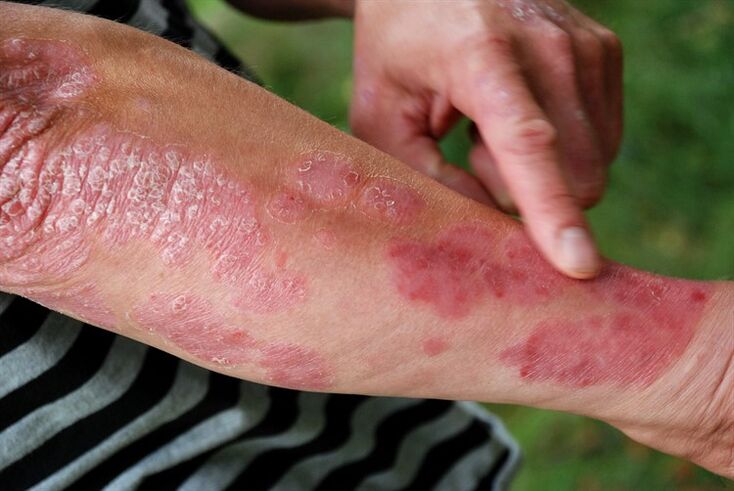Psoriasis is a common skin condition. Its name is derived from the Greek word "psora" (translated "itching"). Today, about 5% of the world’s population suffers from this disease.
Psoriasis can occur at any age, from infants to the elderly. Practice shows that the majority of patients are young. They go to the doctor on suspicion of psoriasis.
Before visiting the clinic, you need to know which specialist to turn to with such complaints.
Which doctor should I go to if I suspect psoriasis?

If you experience the first signs of psoriasis, you should see a dermatologist. After all, the symptoms of this disease first appear on the skin.
A specialist in the competent treatment of skin diseases will make the correct diagnosis and take all necessary therapeutic measures.
If the patient has a complicated type of psoriasis (psoriatic arthropathy), treatment should be carried out by a qualified rheumatologist.
Regardless of which specialist the patient turns to, the doctor can easily confirm or, on the contrary, refute the presence of the disease.
Treating any form of psoriasis is a laborious process. Otherwise, complete healing does not occur in principle. Even with the disappearance of symptoms, the disease enters the regression phase. In this case, the symptoms may disappear completely.
Which doctor treats psoriasis?
Psoriasis is a systemic disease whose symptoms are not limited to skin rashes. Its course is often accompanied by changes in metabolism, disorders of the immune system, and disorders of the endocrine system.

Violations often affect the work of internal bodies. Accordingly, in this case, the consultation of a dermatologist is not sufficient.
Many patients develop psoriasis plaques on the scalp. In this case, too, the advice of a suitable specialist is required.
Dermatologist
It is very important that a patient with psoriasis be checked regularly by an experienced dermatologist. This is very important as this disease can get worse even years after remission.
In addition, the specialist will perform the necessary tests to determine the underlying disease that may have caused the skin disease.
In this case, effective treatment should be given.
All therapeutic measures, regardless of the severity of the disease, should be discussed with the dermatologist. Sometimes psoriasis causes a pathology that affects the joints - psoriatic arthropathy. In case of any complication, the specialist will refer the patient to a rheumatologist.
Specialists
When answering a common question about which specialist to treat psoriasis, many forget that it is important to eliminate not only the external manifestations of the disease, but also the cause of the deterioration in well-being. Accordingly, effective treatment of the disease cannot be without the help of highly trained professionals.

The following doctors treat psoriasis and its common complications:
- gastroenterologist: In case of severe organ damage, the assistance of this doctor is required. In this case, it is often necessary to take strong medications. Although they negatively affect the condition and work of the stomach and liver, the treatment process of these drugs has a good effect;
- cardiologist: the pathology may be accompanied by significant disturbances in the work of the heart (pericarditis, myocarditis). In such cases, the patient simply needs the professional help of a cardiologist;
- nephrologist:certain forms of the disease are accompanied by severe failures, bladder, partial dysfunction of the kidneys. Treatment of such pathologies should be performed by a qualified physician;
- neurologist:neurological pathologies often provoke recurrence of skin disease. Accordingly, patients with a predisposition to prostatitis (or recurrence) should have a preventive examination every 3 to 6 months;
- rheumatologist: Rheumatologist should be consulted for arthropathy. It is impossible to get rid of the disease without a properly chosen treatment principle.
Pathology can only be treated with timely action. Following your doctor’s recommendations will help you cope with your mental discomfort and prevent you from developing complications in the future.
Monitoring by a psychologist is recommended for all patients with psoriasis. More than 78% of the worsening of the disease is due to nervous tension and severe stress.
An experienced psychologist can help any patient cope with emotional stress. As a result, it will be possible to adapt much better to society.
Clarifying the diagnosis: what medical tests should you undergo?

During the initial diagnostic test, if psoriasis is suspected, the patient should perform the following mandatory tests during the first test:
- Analysis of urine: required to determine the water-salt balance;
- stool analysis:necessary to detect the possible presence of helminth samples in the body;
- blood test: general as well as biochemistry. Many patients mistakenly believe that blood helps to refute or confirm the diagnosis. However, this is not quite true. Such a test is performed to identify possible complications caused by the disease. Blood also makes it possible to determine the presence of allergic reactions in the body.
Further studies include:
- bacteriological culture: to be performed if rash appears on the mucosa. This is necessary to rule out pharyngitis (acute);
- radiography: if the patient has joint pain and the doctor suspects the presence of psoriasis of arthritis, an assistive examination of the bone structure is performed;
- skin biopsy: a cytological examination of the epidermis, which has been removed from the affected skin, is performed to clarify the diagnosis. Samples are taken from one or more areas of the body.
What is included in a patient's full medical care?
The ultimate goal of medical work is to preserve a person’s ability to work and to prevent a patient with psoriasis from becoming disabled.
If the patient has already sought professional help in a severe condition, inpatient treatment is required. In satisfactory condition, experts recommend medical observation.
In this case, you should see your doctor regularly. As a result, the dynamics of the disease will be more controllable.
Full medical support for patients with psoriasis includes treatment in a special sanatorium or surgery. It is not uncommon for patients to go to a special rest home for two weeks.
In such healthcare facilities, the patient is under the constant supervision of experienced professionals. However, they do not just check the effectiveness of the treatment. Sanatoriums are also rethinking the most appropriate menu for guests with psoriasis.
Many people agree that psoriasis is an unpleasant disease for the patient (both physically and morally). Fortunately, medicine today knows a number of ways to effectively treat psoriasis.
Patients need to be aware that many professionals today can help them. Regardless of the extent of the disease, this disease should be treated competently. Only with the right approach is it possible to achieve positive results and achieve sustainable remission.























